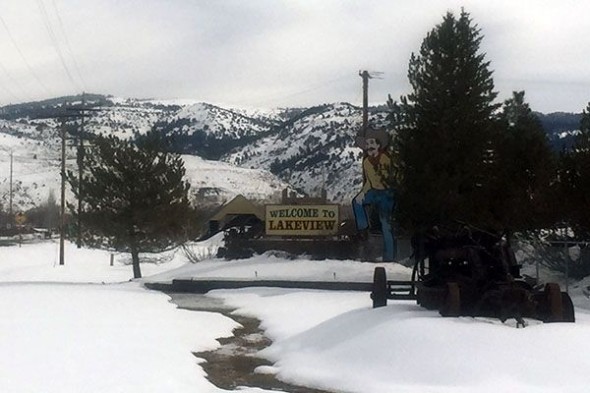Touring Oregon’s High Country: Ratepayers, Renewables, Resiliency
Posted on February 27, 2019 by Mike Goetz
Tags, Energy, Telecommunications, General Interest

Last week, I had the pleasure to embark on a road trip from CUB’s headquarters, here in the low elevations of the Willamette Valley, over mountain passes to the high desert and sagebrush sea that dominates much of the eastern part of our fair state. At CUB, we pride ourselves on representing more than just utility customers’ pocketbooks; we also want to ensure that on-the-ground issues Oregonians are facing are well represented in the utility decision-making processes in Portland and Salem. To that end, I took this road trip to meet and engage with residents, and discuss some of those issues face to face.
My first stop was a visit to Lakeview, the largest town in Lake County, in southeastern Oregon. I emphasize “town” because Lakeview is indeed actually the only town in Oregon – all other municipalities in the state are cities. Not just any town either: at an elevation of 4,802 feet, it is the Tallest Town in Oregon.
Upon arrival I was greeted by CUB Board of Directors member Shelley Batty, who runs a bike store with her husband Thom in downtown Lakeview. Both are active members of the local community. Shelley had a full schedule planned for my visit, including stops at the geothermal facilities, a visit with the Town Council, the Lake County Commission, Lakeview Chamber of Commerce, the Lakeview Rotary Club, and a meeting with the Lake County Resource Initiative (LCRI). LCRI is a local organization working to save customers money, expand their options for heating and electricity, and bring eco-prosperity to the county through bio-physical monitoring of forest lands and aiding in the rollout of small- and large-scale renewable energy.
While the town of Lakeview is relatively small, Lake County is vast and has tremendous potential for renewable energy development. Indeed, that development has already begun. Sophisticated geothermal heat pump systems provide efficient heating to the county’s hospital and penitentiary. Utility scale solar arrays are being built in increasing numbers, and PacifiCorp’s Black Cap solar facility has provided power in the county since October 2012. Part of Lake County’s economic development plan is to continue rollout of renewable energy.
However, Lakeview residents have their fair share of utility-related issues. The town does not currently have natural gas service; the interstate Ruby Pipeline crosses the county just out of reach. Without access to this efficient heating fuel, many Lakeview residents use wood to heat their homes, which can be inefficient and creates air quality issues in the surrounding valley. Expanding access to efficient geothermal heating or finding ways to tap into the nearby natural gas pipeline remain high priority items for Lakeview residents and officials.
This sparsely populated region also has vast swaths of land that are underserved by wireless access service and broadband internet. This makes it difficult for ranchers and rural residents to participate in today’s internet-based economy and society. I met with folks working hard on this issue, and we discussed the work CUB is doing in the 2019 legislative session to help expand rural broadband and wireless service.
There are many complex and interrelated energy, land use, and municipal issues facing the town of Lakeview and Lake County, but a full discussion is beyond the scope of this blog post. I set out to hear firsthand what these issues are, and how we can help address them through our advocacy here at CUB. It was a great experience – I was warmly welcomed and saw easily how hardworking the residents of Lakeview are, and how much they care about making their town and county a better place to live. I know that we at CUB will do our part to help make that a reality.
Next on my tour of Oregon’s high country was a trip up the stunningly beautiful Oregon Outback Scenic Byway, to the city of Bend. Beyond being a lovely place to visit year-round, much of Bend and Deschutes County are served by both PacifiCorp and Cascade Natural Gas, two utilities that CUB helps regulate. The forum here was a bit different than Lakeview: I was honored to have the opportunity to speak on a panel at a monthly forum hosted by the City Club of Central Oregon.
The City Club’s monthly forums cover a wide range of issues; this edition focused on an issue that has broad community impact and has recently been a hot topic in the energy sector: resiliency. There are many external threats to our energy system and communities which may test their resiliency in coming years, such as earthquakes (including the feared Cascadia Subduction Zone event), wildfires and storms that are increasing in severity due to climate change, and cyber- and physical attacks to energy infrastructure.
Alongside my fellow panelists, I discussed how these events may impact our energy, water, and communities, as well as steps that the utilities, the Oregon Public Utility Commission, the Oregon Department of Energy, and the Governor’s Office are taking to prepare. I also highlighted an unfortunate fact: much of this centralized planning has been lacking in proactive strategies to educate end-use consumers and residential customers. In the event of a large earthquake, many homes will be sheared from their foundations and gas and water pipes will rupture. It is imperative that end use customers know how to turn off their natural gas service to avoid widespread fires and explosions, and mitigate the effects of a traumatic event such as this. CUB has a natural role to play in this education effort - watch the CUB blog for future updates on what customers can do to build resiliency in their homes and communities.
To keep up with CUB, like us on Facebook and follow us on Twitter!




02/27/19 | 0 Comments | Touring Oregon’s High Country: Ratepayers, Renewables, Resiliency